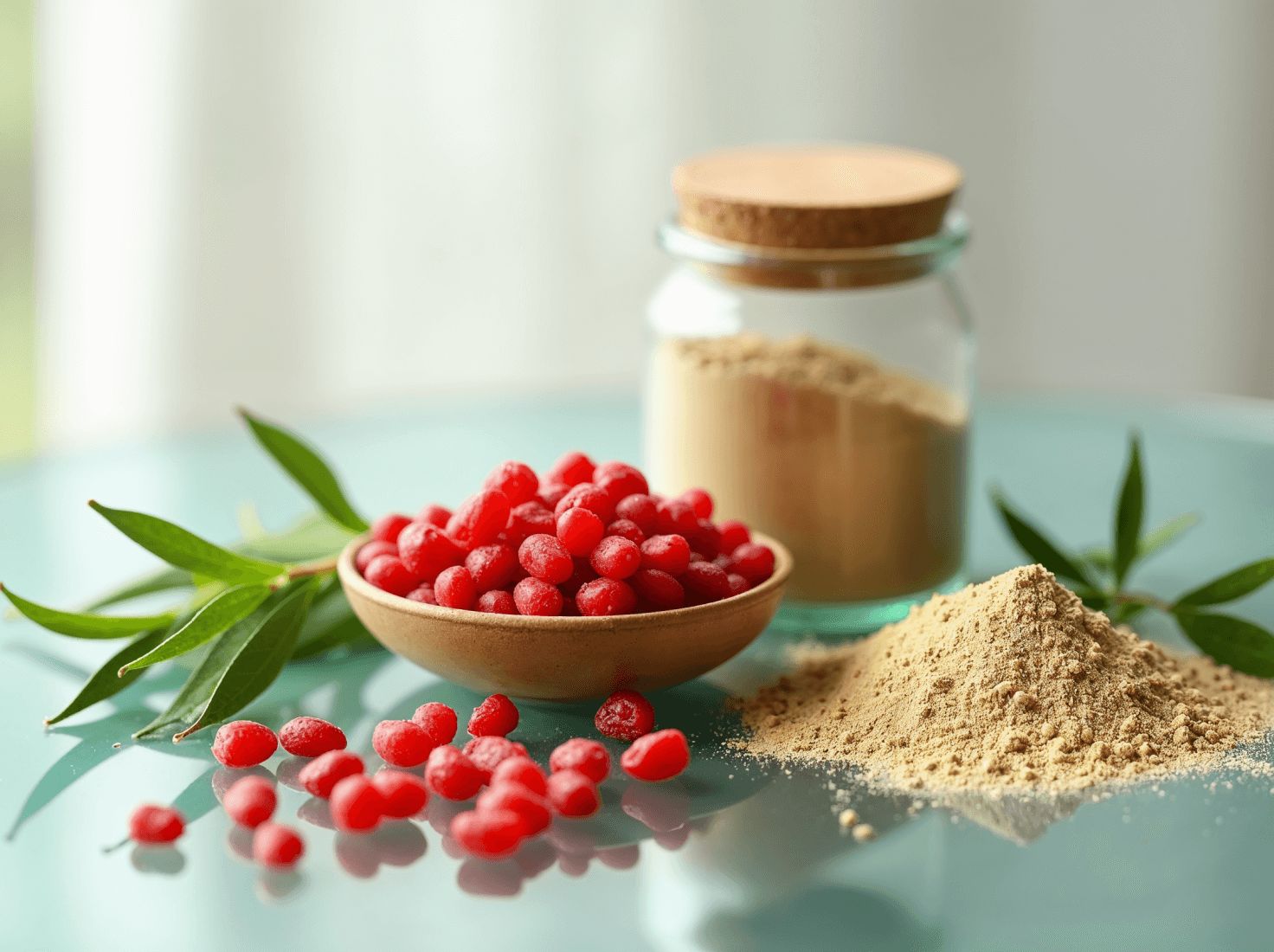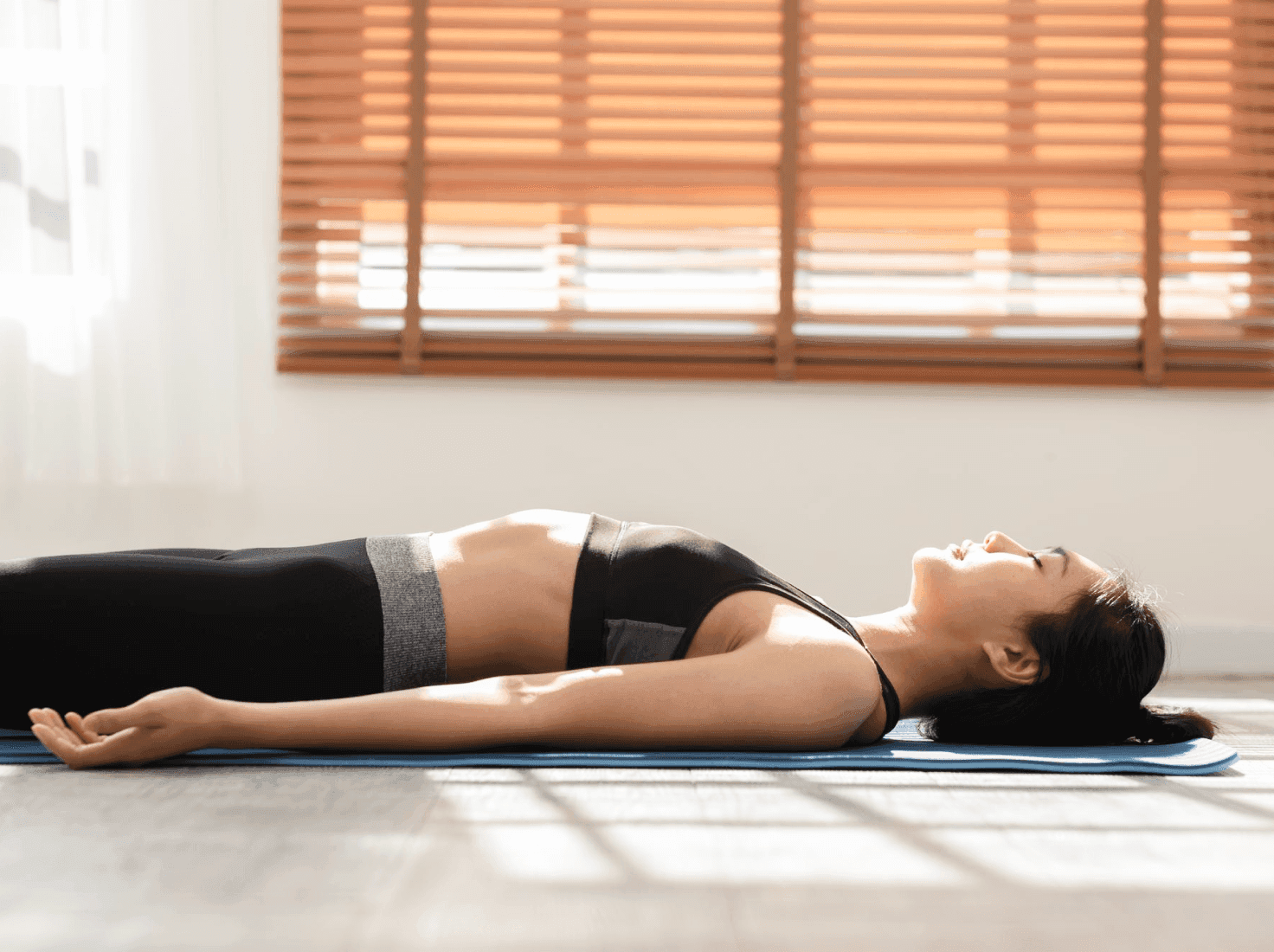❤️ Valentines Day Special $50 Off Your First Month ❤️ PT141 for Couples 🚀

❤️ Valentines Day Special $50 Off Your First Month ❤️ PT141 for Couples 🚀


First consultation?

Need a refill?

First consultation?

Need a refill?
Achieve perfect hormonal balance naturally
4 mins read
•
By
Leah Bush
• Jul 8, 2024
Ever feel like your body's playing a game of emotional pinball, bouncing between energy spikes and fatigue slumps? Welcome to the world of hormones – those tiny chemical messengers that have a big impact on how we feel, look, and function.
But don't worry if things seem a bit off; you're about to embark on a journey to hormonal harmony. In this guide, we'll explore practical ways to nudge your hormones back into balance, from simple lifestyle tweaks to cutting-edge approaches.
So, let's roll up our sleeves and dive into the fascinating world of hormone health!
The Rhythm of Life: Syncing with Your Natural Cycles
Your body has its own internal clock, and working with it (not against it) can do wonders for your hormones.
Our circadian rhythm, which regulates the sleep-wake cycle, is heavily influenced by light exposure.
Morning light, especially natural sunlight, is a powerful signal for waking due to its unique blue-to-yellow light ratio, and outdoor light is much brighter than indoor lighting, helping synchronize our internal clock.
However, exposure to bright or blue light from screens at night can disrupt this rhythm, leading to misalignment between light cues, melatonin levels, and body temperature.
This disruption affects sleep and can lead to mental health and cognitive issues, making light regulation essential for overall well-being.¹ To read more about the importance of rest and sleep refer to our detailed blog about sleep. LinkFor women, tracking your menstrual cycle and adapting your activities to each phase can be a game-changer. It's not about strict schedules; it's about flowing with your body's natural ebbs and flows.
The length of the cycle differs for each woman, averaging 28 days but ranging from 21 to 35 days. Consistency in cycle length is important, and significant variability may necessitate an encounter with a health professional.

Green Scene: Harnessing the Power of Plants
Mother Nature's got your back when it comes to hormone health.
Certain plants, known as adaptogens, can help your body manage stress and balance hormones.
Here's a list of adaptogens and the benefits they offer :
American ginseng : May boost memory, reaction time, calmness and immune system.²
Ashwagandha : May reduce stress and anxiety³
Cordyceps : May boost stamina⁴
Goji berry : May boost energy, physical as well as mental performance, calmness, well-being and may improve sleep.⁵
Licorice root : May reduce oxidative stress⁶
Tulsi (Holy basil) : May reduce physical and mental stress, stress-related anxiety, and depression, may also improve memory and thinking.⁷
Turmeric : May reduce inflammation and depression.⁸

Sweat Smart: Exercise for Hormonal Harmony
When it comes to exercise and hormones, it's all about finding the sweet spot. Too little, and you miss out on the hormone-balancing benefits. Too much, and you might stress your system.
Mix up high-intensity workouts with gentler activities like yoga or tai chi. And here's a pro tip: try syncing your workouts with your hormonal cycle.
HIIT training : HIIT is a training protocol where you perform short periods of high intensity aerobic exercise followed by a short low-intensity work. Typically it is a 30-second bout of intense exercise followed by a 15-20 second low-intensity work. You repeat this format over 20 minutes, taking a 20-30 second break every 5 minutes.⁹
Examples :
Running for 30 seconds, then walking for a minute, repeated over 20 minutes.
Squats, Burpees, Jumping Lunges, Pushups, High knees, Plank and bear walks done for 30 seconds, with 15 second break or low-intensity work in between exercises. This is to be performed non-stop.
The Gut-Hormone Connection: Nurturing Your Inner Ecosystem
Did you know your gut health plays a huge role in hormone balance? It's true! A happy gut microbiome helps regulate estrogen levels and supports overall hormone health.
Some tools that can help you improve your gut health are :
Prebiotics : Garlic, Bananas, Onions, Chicory, Jerusalem artichokes, Asparagus, Leeks.¹⁰
Probiotics : sauerkraut, yogurt, kimchi, kombucha, kefir, brine, pickled cucumbers, tempeh, buttermilk.¹¹
Avoid processed foods : Avoid processed foods that contain Emulsifiers as they can disrupt the GI tract, negatively impacting gut health.¹²

Mindful Moments: The Power of Presence
In our hyper-connected world, constant stimulation can wreak havoc on our hormones, particularly stress hormones like cortisol.
Enter mindfulness. Taking even just a few minutes each day to practice mindfulness can help regulate your body's stress response. Try a short meditation, mindful walking, or even mindful eating.¹³
Some practices that you may find helpful are :
Non-sleep deep rest (NSDR) refers to practices that bring the brain and body into deep relaxation without full sleep. Yoga nidra, a specific form, involves guided meditation or body scans while lying down.
Meditation fosters emotional calm and clarity, with focused techniques like breathing or visualization, while mindfulness meditation allows thoughts to flow without attachment. Hypnosis, similar to meditation, helps self-direct the mind into relaxed states. Breathwork, like controlled breathing, reduces stress and anxiety.
These zero-cost practices are beginner-friendly and time-efficient, with even 10-minute sessions improving energy, cognition, and well-being.
Peptide Pioneers: Exploring New Frontiers
While lifestyle changes form the cornerstone of hormone balance, emerging science offers some intriguing options. Peptides like Enclomiphene citrate and Progesterone are making waves in the world of hormone health.
Enclomiphene citrate can help boost natural testosterone production in men, potentially improving energy and vitality.¹⁴
Progesterone, crucial for women's health, can help balance estrogen levels and support overall well-being.¹⁵
These aren't one-size-fits-all solutions, but under proper medical guidance, they might be the missing piece in your hormone puzzle. Always consult with a healthcare provider to see if these options are right for you – they're your co-pilot on this hormonal journey!
Remember, balancing your hormones isn't about achieving perfection. It's about finding what works for you and creating a lifestyle that supports your body's natural rhythms. Be patient with yourself, stay curious, and celebrate the small wins along the way. With some thoughtful adjustments and maybe a dash of scientific innovation, you're on your way to feeling more balanced, energized, and in tune with your amazing body. Here's to your hormonal adventure!
Sources :
Schroeder AM, Colwell CS. How to fix a broken clock. Trends Pharmacol Sci. 2013 Nov;34(11):605-19. doi: 10.1016/j.tips.2013.09.002. Epub 2013 Oct 10. PMID: 24120229; PMCID: PMC3856231.
Scholey, A., Ossoukhova, A., Owen, L., Ibarra, A., Pipingas, A., He, K., Roller, M., & Stough, C. (2010). Effects of American ginseng (Panax quinquefolius) on neurocognitive function: an acute, randomised, double-blind, placebo-controlled, crossover study. Psychopharmacology, 212(3), 345–356. https://doi.org/10.1007/s00213-010-1964-y
Speers, A. B., Cabey, K. A., Soumyanath, A., & Wright, K. M. (2021). Effects of Withania somnifera (Ashwagandha) on Stress and the Stress- Related Neuropsychiatric Disorders Anxiety, Depression, and Insomnia. Current Neuropharmacology, 19(9), 1468–1495. https://doi.org/10.2174/1570159x19666210712151556
Tuli, H.S., Sandhu, S.S. & Sharma, A.K. Pharmacological and therapeutic potential of Cordyceps with special reference to Cordycepin. 3 Biotech 4, 1–12 (2014). https://doi.org/10.1007/s13205-013-0121-9
Cheng, J., Zhou, Z., Sheng, H., He, L., Fan, X., He, Z., Sun, T., Zhang, X., Zhao, R. J., Gu, L., Cao, C., & Zhou, S. (2014). An evidence-based update on the pharmacological activities and possible molecular targets of Lycium barbarum polysaccharides. Drug Design Development and Therapy, 33. https://doi.org/10.2147/dddt.s72892
Wahab, S., Annadurai, S., Abullais, S. S., Das, G., Ahmad, W., Ahmad, M. F., Kandasamy, G., Vasudevan, R., Ali, M. S., & Amir, M. (2021). Glycyrrhiza glabra (Licorice): A Comprehensive Review on Its Phytochemistry, Biological Activities, Clinical Evidence and Toxicology. Plants, 10(12), 2751. https://doi.org/10.3390/plants10122751
Cohen, M. (2014). Tulsi - Ocimum sanctum: A herb for all reasons. Journal of Ayurveda and Integrative Medicine, 5(4), 251. https://doi.org/10.4103/0975-9476.146554
Lopresti, A. L. (2022). Potential role of curcumin for the treatment of major depressive disorder. CNS Drugs, 36(2), 123–141. https://doi.org/10.1007/s40263-022-00901-9
Atakan, M. M., Li, Y., Koşar, Ş. N., Turnagöl, H. H., & Yan, X. (2021). Evidence-Based Effects of High-Intensity Interval Training on Exercise Capacity and Health: A Review with Historical Perspective. International Journal of Environmental Research and Public Health, 18(13), 7201. https://doi.org/10.3390/ijerph18137201
Davani-Davari, D., Negahdaripour, M., Karimzadeh, I., Seifan, M., Mohkam, M., Masoumi, S., Berenjian, A., & Ghasemi, Y. (2019). Prebiotics: definition, types, sources, mechanisms, and clinical applications. Foods, 8(3), 92. https://doi.org/10.3390/foods8030092
Syngai, G. G., Gopi, R., Bharali, R., Dey, S., Lakshmanan, G. M. A., & Ahmed, G. (2015). Probiotics - the versatile functional food ingredients. Journal of Food Science and Technology, 53(2), 921–933. https://doi.org/10.1007/s13197-015-2011-0
Fang, Z., Rossato, S. L., Hang, D., Khandpur, N., Wang, K., Lo, C., Willett, W. C., Giovannucci, E. L., & Song, M. (2024). Association of ultra-processed food consumption with all cause and cause specific mortality: population based cohort study. BMJ, e078476. https://doi.org/10.1136/bmj-2023-078476
Herr, R., Barrech, A., Riedel, N., Gündel, H., Angerer, P., & Li, J. (2018). Long-Term effectiveness of stress management at work: Effects of the changes in perceived stress reactivity on mental health and sleep problems Seven years later. International Journal of Environmental Research and Public Health, 15(2), 255. https://doi.org/10.3390/ijerph15020255
Wiehle, R., Cunningham, G. R., Pitteloud, N., Wike, J., Hsu, K., Fontenot, G. K., Rosner, M., Dwyer, A., & Podolski, J. (2013). Testosterone restoration using enclomiphene citrate in men with secondary hypogonadism: a pharmacodynamic and pharmacokinetic study. BJU International, 112(8), 1188–1200. https://doi.org/10.1111/bju.12363
Cable, J. K., & Grider, M. H. (2023, May 1). Physiology, progesterone. StatPearls - NCBI Bookshelf. https://www.ncbi.nlm.nih.gov/books/NBK558960/
Current version
Jul 8, 2024
Written by
Leah Bush (Acute Care Nurse Practitioner)
Balance your hormones
with Enclomiphene or Progesterone
Complete our quick questionnaire to identify if you qualify. (approx 3 min)

Get meds delivered from
the comfort of your home.
Download our app now, and get amazing rewards!


Achieve perfect hormonal balance naturally
4 mins read
•
By
Leah Bush
• Jul 8, 2024
Ever feel like your body's playing a game of emotional pinball, bouncing between energy spikes and fatigue slumps? Welcome to the world of hormones – those tiny chemical messengers that have a big impact on how we feel, look, and function.
But don't worry if things seem a bit off; you're about to embark on a journey to hormonal harmony. In this guide, we'll explore practical ways to nudge your hormones back into balance, from simple lifestyle tweaks to cutting-edge approaches.
So, let's roll up our sleeves and dive into the fascinating world of hormone health!
The Rhythm of Life: Syncing with Your Natural Cycles
Your body has its own internal clock, and working with it (not against it) can do wonders for your hormones.
Our circadian rhythm, which regulates the sleep-wake cycle, is heavily influenced by light exposure.
Morning light, especially natural sunlight, is a powerful signal for waking due to its unique blue-to-yellow light ratio, and outdoor light is much brighter than indoor lighting, helping synchronize our internal clock.
However, exposure to bright or blue light from screens at night can disrupt this rhythm, leading to misalignment between light cues, melatonin levels, and body temperature.
This disruption affects sleep and can lead to mental health and cognitive issues, making light regulation essential for overall well-being.¹ To read more about the importance of rest and sleep refer to our detailed blog about sleep. LinkFor women, tracking your menstrual cycle and adapting your activities to each phase can be a game-changer. It's not about strict schedules; it's about flowing with your body's natural ebbs and flows.
The length of the cycle differs for each woman, averaging 28 days but ranging from 21 to 35 days. Consistency in cycle length is important, and significant variability may necessitate an encounter with a health professional.
Green Scene: Harnessing the Power of Plants
Mother Nature's got your back when it comes to hormone health.
Certain plants, known as adaptogens, can help your body manage stress and balance hormones.
Here's a list of adaptogens and the benefits they offer :
American ginseng : May boost memory, reaction time, calmness and immune system.²
Ashwagandha : May reduce stress and anxiety³
Cordyceps : May boost stamina⁴
Goji berry : May boost energy, physical as well as mental performance, calmness, well-being and may improve sleep.⁵
Licorice root : May reduce oxidative stress⁶
Tulsi (Holy basil) : May reduce physical and mental stress, stress-related anxiety, and depression, may also improve memory and thinking.⁷
Turmeric : May reduce inflammation and depression.⁸
Sweat Smart: Exercise for Hormonal Harmony
When it comes to exercise and hormones, it's all about finding the sweet spot. Too little, and you miss out on the hormone-balancing benefits. Too much, and you might stress your system.
Mix up high-intensity workouts with gentler activities like yoga or tai chi. And here's a pro tip: try syncing your workouts with your hormonal cycle.
HIIT training : HIIT is a training protocol where you perform short periods of high intensity aerobic exercise followed by a short low-intensity work. Typically it is a 30-second bout of intense exercise followed by a 15-20 second low-intensity work. You repeat this format over 20 minutes, taking a 20-30 second break every 5 minutes.⁹
Examples :
Running for 30 seconds, then walking for a minute, repeated over 20 minutes.
Squats, Burpees, Jumping Lunges, Pushups, High knees, Plank and bear walks done for 30 seconds, with 15 second break or low-intensity work in between exercises. This is to be performed non-stop.
The Gut-Hormone Connection: Nurturing Your Inner Ecosystem
Did you know your gut health plays a huge role in hormone balance? It's true! A happy gut microbiome helps regulate estrogen levels and supports overall hormone health.
Some tools that can help you improve your gut health are :
Prebiotics : Garlic, Bananas, Onions, Chicory, Jerusalem artichokes, Asparagus, Leeks.¹⁰
Probiotics : sauerkraut, yogurt, kimchi, kombucha, kefir, brine, pickled cucumbers, tempeh, buttermilk.¹¹
Avoid processed foods : Avoid processed foods that contain Emulsifiers as they can disrupt the GI tract, negatively impacting gut health.¹²
Mindful Moments: The Power of Presence
In our hyper-connected world, constant stimulation can wreak havoc on our hormones, particularly stress hormones like cortisol.
Enter mindfulness. Taking even just a few minutes each day to practice mindfulness can help regulate your body's stress response. Try a short meditation, mindful walking, or even mindful eating.¹³
Some practices that you may find helpful are :
Non-sleep deep rest (NSDR) refers to practices that bring the brain and body into deep relaxation without full sleep. Yoga nidra, a specific form, involves guided meditation or body scans while lying down.
Meditation fosters emotional calm and clarity, with focused techniques like breathing or visualization, while mindfulness meditation allows thoughts to flow without attachment. Hypnosis, similar to meditation, helps self-direct the mind into relaxed states. Breathwork, like controlled breathing, reduces stress and anxiety.
These zero-cost practices are beginner-friendly and time-efficient, with even 10-minute sessions improving energy, cognition, and well-being.
Peptide Pioneers: Exploring New Frontiers
While lifestyle changes form the cornerstone of hormone balance, emerging science offers some intriguing options. Peptides like Enclomiphene citrate and Progesterone are making waves in the world of hormone health.
Enclomiphene citrate can help boost natural testosterone production in men, potentially improving energy and vitality.¹⁴
Progesterone, crucial for women's health, can help balance estrogen levels and support overall well-being.¹⁵
These aren't one-size-fits-all solutions, but under proper medical guidance, they might be the missing piece in your hormone puzzle. Always consult with a healthcare provider to see if these options are right for you – they're your co-pilot on this hormonal journey!
Remember, balancing your hormones isn't about achieving perfection. It's about finding what works for you and creating a lifestyle that supports your body's natural rhythms. Be patient with yourself, stay curious, and celebrate the small wins along the way. With some thoughtful adjustments and maybe a dash of scientific innovation, you're on your way to feeling more balanced, energized, and in tune with your amazing body. Here's to your hormonal adventure!






Current version
Jul 8, 2024
Written by
Leah Bush (Acute Care Nurse Practitioner)
Fact checked by
Dr. Jonathan Hinds (MD, FACEP, Certified Physician)
Sources :
Schroeder AM, Colwell CS. How to fix a broken clock. Trends Pharmacol Sci. 2013 Nov;34(11):605-19. doi: 10.1016/j.tips.2013.09.002. Epub 2013 Oct 10. PMID: 24120229; PMCID: PMC3856231.
Scholey, A., Ossoukhova, A., Owen, L., Ibarra, A., Pipingas, A., He, K., Roller, M., & Stough, C. (2010). Effects of American ginseng (Panax quinquefolius) on neurocognitive function: an acute, randomised, double-blind, placebo-controlled, crossover study. Psychopharmacology, 212(3), 345–356. https://doi.org/10.1007/s00213-010-1964-y
Speers, A. B., Cabey, K. A., Soumyanath, A., & Wright, K. M. (2021). Effects of Withania somnifera (Ashwagandha) on Stress and the Stress- Related Neuropsychiatric Disorders Anxiety, Depression, and Insomnia. Current Neuropharmacology, 19(9), 1468–1495. https://doi.org/10.2174/1570159x19666210712151556
Tuli, H.S., Sandhu, S.S. & Sharma, A.K. Pharmacological and therapeutic potential of Cordyceps with special reference to Cordycepin. 3 Biotech 4, 1–12 (2014). https://doi.org/10.1007/s13205-013-0121-9
Cheng, J., Zhou, Z., Sheng, H., He, L., Fan, X., He, Z., Sun, T., Zhang, X., Zhao, R. J., Gu, L., Cao, C., & Zhou, S. (2014). An evidence-based update on the pharmacological activities and possible molecular targets of Lycium barbarum polysaccharides. Drug Design Development and Therapy, 33. https://doi.org/10.2147/dddt.s72892
Wahab, S., Annadurai, S., Abullais, S. S., Das, G., Ahmad, W., Ahmad, M. F., Kandasamy, G., Vasudevan, R., Ali, M. S., & Amir, M. (2021). Glycyrrhiza glabra (Licorice): A Comprehensive Review on Its Phytochemistry, Biological Activities, Clinical Evidence and Toxicology. Plants, 10(12), 2751. https://doi.org/10.3390/plants10122751
Cohen, M. (2014). Tulsi - Ocimum sanctum: A herb for all reasons. Journal of Ayurveda and Integrative Medicine, 5(4), 251. https://doi.org/10.4103/0975-9476.146554
Lopresti, A. L. (2022). Potential role of curcumin for the treatment of major depressive disorder. CNS Drugs, 36(2), 123–141. https://doi.org/10.1007/s40263-022-00901-9
Atakan, M. M., Li, Y., Koşar, Ş. N., Turnagöl, H. H., & Yan, X. (2021). Evidence-Based Effects of High-Intensity Interval Training on Exercise Capacity and Health: A Review with Historical Perspective. International Journal of Environmental Research and Public Health, 18(13), 7201. https://doi.org/10.3390/ijerph18137201
Davani-Davari, D., Negahdaripour, M., Karimzadeh, I., Seifan, M., Mohkam, M., Masoumi, S., Berenjian, A., & Ghasemi, Y. (2019). Prebiotics: definition, types, sources, mechanisms, and clinical applications. Foods, 8(3), 92. https://doi.org/10.3390/foods8030092
Syngai, G. G., Gopi, R., Bharali, R., Dey, S., Lakshmanan, G. M. A., & Ahmed, G. (2015). Probiotics - the versatile functional food ingredients. Journal of Food Science and Technology, 53(2), 921–933. https://doi.org/10.1007/s13197-015-2011-0
Fang, Z., Rossato, S. L., Hang, D., Khandpur, N., Wang, K., Lo, C., Willett, W. C., Giovannucci, E. L., & Song, M. (2024). Association of ultra-processed food consumption with all cause and cause specific mortality: population based cohort study. BMJ, e078476. https://doi.org/10.1136/bmj-2023-078476
Herr, R., Barrech, A., Riedel, N., Gündel, H., Angerer, P., & Li, J. (2018). Long-Term effectiveness of stress management at work: Effects of the changes in perceived stress reactivity on mental health and sleep problems Seven years later. International Journal of Environmental Research and Public Health, 15(2), 255. https://doi.org/10.3390/ijerph15020255
Wiehle, R., Cunningham, G. R., Pitteloud, N., Wike, J., Hsu, K., Fontenot, G. K., Rosner, M., Dwyer, A., & Podolski, J. (2013). Testosterone restoration using enclomiphene citrate in men with secondary hypogonadism: a pharmacodynamic and pharmacokinetic study. BJU International, 112(8), 1188–1200. https://doi.org/10.1111/bju.12363
Cable, J. K., & Grider, M. H. (2023, May 1). Physiology, progesterone. StatPearls - NCBI Bookshelf. https://www.ncbi.nlm.nih.gov/books/NBK558960/
Similar Health Guides
Balanced hormones
with Enclomiphene or Progesterone
Complete our quick questionnaire to identify if you qualify. (approx 3 min)

Balanced hormones
with Enclomiphene or Progesterone
Complete our quick questionnaire to identify if you qualify. (approx 3 min)





